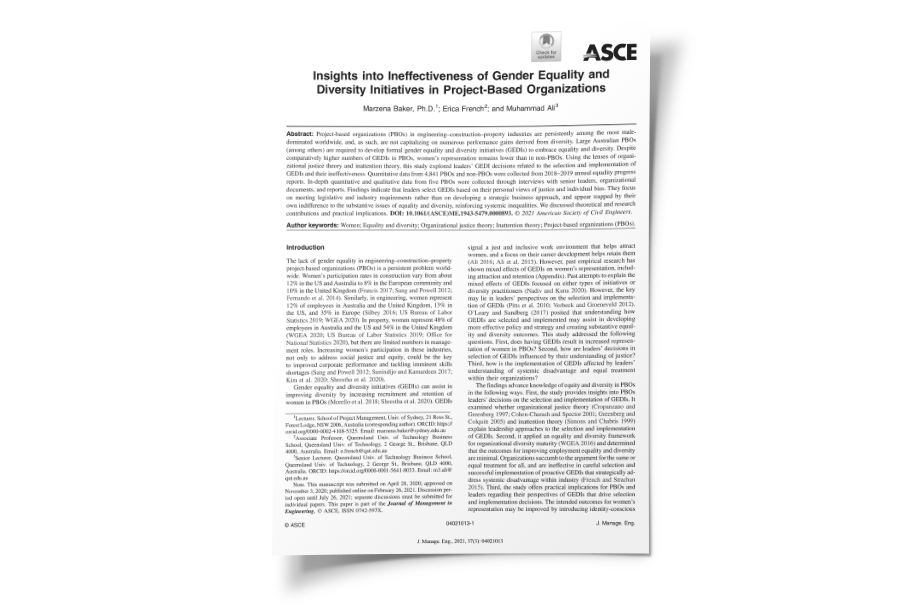Abstract
Project-based organizations (PBOs) in engineering–construction–property industries are persistently among the most male-dominated worldwide, and, as such, are not capitalizing on numerous performance gains derived from diversity. Large Australian PBOs (among others) are required to develop formal gender equality and diversity initiatives (GEDIs) to embrace equality and diversity. Despite comparatively higher numbers of GEDIs in PBOs, women’s representation remains lower than in non-PBOs. Using the lenses of organizational justice theory and inattention theory, this study explored leaders’ GEDI decisions related to the selection and implementation of GEDIs and their ineffectiveness. Quantitative data from 4,841 PBOs and non-PBOs were collected from 2018–2019 annual equality progress reports. In-depth quantitative and qualitative data from five PBOs were collected through interviews with senior leaders, organizational documents, and reports. Findings indicate that leaders select GEDIs based on their personal views of justice and individual bias. They focus on meeting legislative and industry requirements rather than on developing a strategic business approach, and appear trapped by their own indifference to the substantive issues of equality and diversity, reinforcing systemic inequalities. We discussed theoretical and research contributions and practical implications.
Potential Industry Impact
- Leaders play critical role in the selection and implementation of diversity policies and programs and therefore in shaping the diversity and inclusion culture of their organisations.
- However, organisational leaders appear to be unaware of the systemic structural and cultural barriers to diversity in their organisations.
- Study calls for leaders to encourage behaviours and values that promote organisational transformation to address systemic equality and diversity challenges and improve effectiveness of the diversity policies.
- Study calls for leaders to examine and explore the opportunity for special-measure strategies to enable a substantial change in equality and diversity outcomes in project-based organisations.
- Organisation specific Business Case for diversity, comprehensive targets and measured performance are critical elements for effective business outcomes.
Academic Impact
- Delivering supporting evidence to the argument that current gender diversity policies and programs have fallen short in delivering significant, innovative or transformative outcomes for project-based organisations.
- While multiple in number, gender diversity policies and programs are ineffective as they are lacking organisational support, particularly leadership focus. Current implementation of these initiatives appears to support business outcomes but, in effect, does little more than provide lip service to validate compliance with legal requirements and industry expectations.
- The study supports the argument that organisational justice theory is limited in explaining leadership decisions in the selection and implementation of gender diversity policies and programs. The various models of justice lack recognition of substantive barriers arising from structural inequalities. Procedural justice appears to be a driving force behind the design and implementation of those initiatives limiting the substantiative change.

Authors:
Marzena Baker, Erica French, Muhammad Ali
Journal:
Journal of Management in Engineering, Volume 37, Issue 3 (May, 2021)
Read:
https://ascelibrary.org/doi/10.1061/%28ASCE%29ME.1943-5479.0000893

